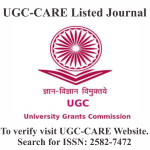MARGINS WITHIN MARGINS: DUAL STRUGGLES OF HIJRA IDENTITY IN THE AUTOBIOGRAPHIES OF LAXMI AND REVATHI
DOI:
https://doi.org/10.29121/shodhkosh.v5.i4.2024.6035Keywords:
Hijra Identity, Narrative Resistance, Gendered Subalternity, Language And Power, Hijra AutobiographyAbstract [English]
This paper examines the dual struggles of hijra individuals in India and deals with the marginalization they experience both within mainstream society and within their community. Through a critical analysis of two autobiographies titled Me Hijra, Me Laxmi by Laxmi Narayan Tripathi and The Truth About Me: A Hijra Life Story by A. Revathi, this study investigates how language is used to construct, resist, and negotiate power. Norman Fairclough’s Critical Discourse Analysis (CDA) and Gayatri Chakravorty Spivak’s theory of subalternity have been employed in this study to explore how autobiographical narratives can be used to investigate the ideology and power structures that are involved in their dual marginalization.
References
Anuar, N.A.N.B. and Asl, M.P. (2021). ‘Gender and Sexual Identity in Arundhati Roy's The Ministry of Utmost Happiness: A Cixousian Analysis of Hijra's Resistance and Remaking of the Self’. Pertanika Journal of Social Sciences & Humanities, 29(4), pp.2335-2352. DOI: https://doi.org/10.47836/pjssh.29.4.13
Bhattacharya, S. (2019). ‘The Transgender Nation and its Margins: The Many Lives of the Law’. South Asia Multidisciplinary Academic Journal, (20). Available at: https://doi.org/10.4000/samaj.4930 DOI: https://doi.org/10.4000/samaj.4930
Boruah, R. (2020). ‘TRANS LIFE IN INDIA: A STUDY OF THREE AUTOBIOGRAPHIES’, Journal of Natural Remedies Vol. 21, No. 8(1), pp.180-192.
Fairclough, N. (1989). Language and power. Longman Group UK Limited.
Hazarika, P. (2021). ‘Examining the Nuances of Trauma Through a Survivor’s Testimony: A Study of A Gift of Goddess Lakshmi: A Candid Biography of India’s First Transgender Principal by Manobi Bandyopadhyay with Jhimli Mukherjee Pandey’, Rupkatha Journal on Interdisciplinary Studies in Humanities, pp.1-9
Jain, D. and Rhoten, K.M. (2020). ‘Epistemic Injustice and Judicial Discourse on Transgender Rights in India: Uncovering Temporal Pluralism’. Journal of Human Values, 26(1), pp.30-49. DOI: https://doi.org/10.1177/0971685819890186
Kalra, G. (2012). Hijras: the unique transgender culture of India. International Journal of Culture and Mental Health, 5(2), pp.121-126. DOI: https://doi.org/10.1080/17542863.2011.570915
Laxmi. (2015). Me Hijra, Me Laxmi. Oxford University Press.
Loh U, J. (2018). ‘transgender identity, sexual versus gender ‘rights’ and the tools of the Indian state’. Feminist Review, 119(1), pp.39-55. DOI: https://doi.org/10.1057/s41305-018-0124-9
Revathi, A. (2010). The Truth About Me: A Hijra Life Story. Penguin Random House India Pvt. Ltd.
Shanka, P., Rajaraman, B.K., Shaikh, A., Patel, P., Nannapaneni, A., Sharma, S., Sharma, R., Sarkar, A. and Pemde, H. (2022). ‘Decolonising gender in India’. The Lancet Global Healt.h, 10(2), pp.e173-e174. DOI: https://doi.org/10.1016/S2214-109X(21)00523-4
Spivak, G.C., 1993. Can the subaltern speak? In: P. Williams and L. Chrisman, eds. Colonial discourse and post-colonial theory: a reader, pp.66–111.
Subramanian, P. (2022). ‘Clapping Along or Clapping Back: Of the Discourse of Hijra Community’s Resilient Happiness in Y-Film’s Hum Hain Happy’. Society and Culture in South Asia, p.1-23. DOI: https://doi.org/10.1177/23938617221076181
Downloads
Published
How to Cite
Issue
Section
License
Copyright (c) 2024 Hamsringdi Maibangsa, Dr Jyoti Jayal

This work is licensed under a Creative Commons Attribution 4.0 International License.
With the licence CC-BY, authors retain the copyright, allowing anyone to download, reuse, re-print, modify, distribute, and/or copy their contribution. The work must be properly attributed to its author.
It is not necessary to ask for further permission from the author or journal board.
This journal provides immediate open access to its content on the principle that making research freely available to the public supports a greater global exchange of knowledge.




















